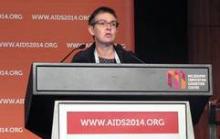MELBOURNE – One-third of HIV-positive children treated with antiretroviral therapy before 3 months of age will become HIV antibody–negative, but still be HIV positive, according to data presented at the 20th International AIDS Conference.
Presenter Louise Kuhn, Ph.D., professor of epidemiology at the Mailman School of Public Health at Columbia University, N.Y., said these perinatally infected children were likely to encounter clinical confusion in their later life because of their antibody-negative status.
Dr. Kuhn and her colleagues found around 30% of children who began antiretroviral therapy (ART) before 3 months of age had undetectable HIV antibodies when tested between 3-6 years of age using a standard enzyme-linked immunosorbent assay (ELISA).
The frequency of antibody-negative status decreased with increasing age of ART initiation – overall, 16% of children who began treatment before 6 months of age had low or no HIV antibodies, but there were no antibody-negative children among those who began treatment after 6 months of age.
The retrospective study initially enrolled 104 HIV-infected children aged 3-6 years from Johannesburg, South Africa, who were under 15 months of age when they started ART but were now virally suppressed with a viral load below 50 copies/mL. Researchers later added another 122 children who had begun treatment before 6 months of age.
Dr. Kuhn said standard HIV antibody tests are usually considered diagnostic, however, it was not previously expected that some individuals would revert to being antibody negative.
"In the pediatric field, there have been anecdotal reports of treated children known to be HIV infected but who have lost their HIV-positive status over time, including the Mississippi baby, as well as several other well-treated children who started therapy early," Dr Kuhn said at the conference.
The phenomenon is likely to cause some confusion in the clinical setting, for example when it comes to disclosure or children wanting to be retested, and the clinical significance of HIV antibody–negative status is unclear.
"One doesn’t want to by any means be telling the parents that their child is now negative and they can stop treatment, so I think addressing that confusion potentially might be a bigger problem going forward," Dr. Kuhn said in an interview.
"It’s about the health care workers being really educated and attuned to the subtleties of this, which I think we’re only beginning to appreciate as HIV turns out to be more complicated than we hoped," she said.
Dr. Kuhn said the standard practice of testing children 4-6 weeks after birth may be too late because by the time treatment is usually initiated, they are already around 3 months old.
"I was trying to make that point that we’re too late with what we’re doing currently, they’ve got to shift it earlier," she said.
"We’re learning more and more about what’s going on with early treatment, and so it’s opening up a whole area of research that we really need to look at in more detail in terms of what is happening with neonatal immune development, which may be related to HIV control," she concluded.
There were no disclosures.


